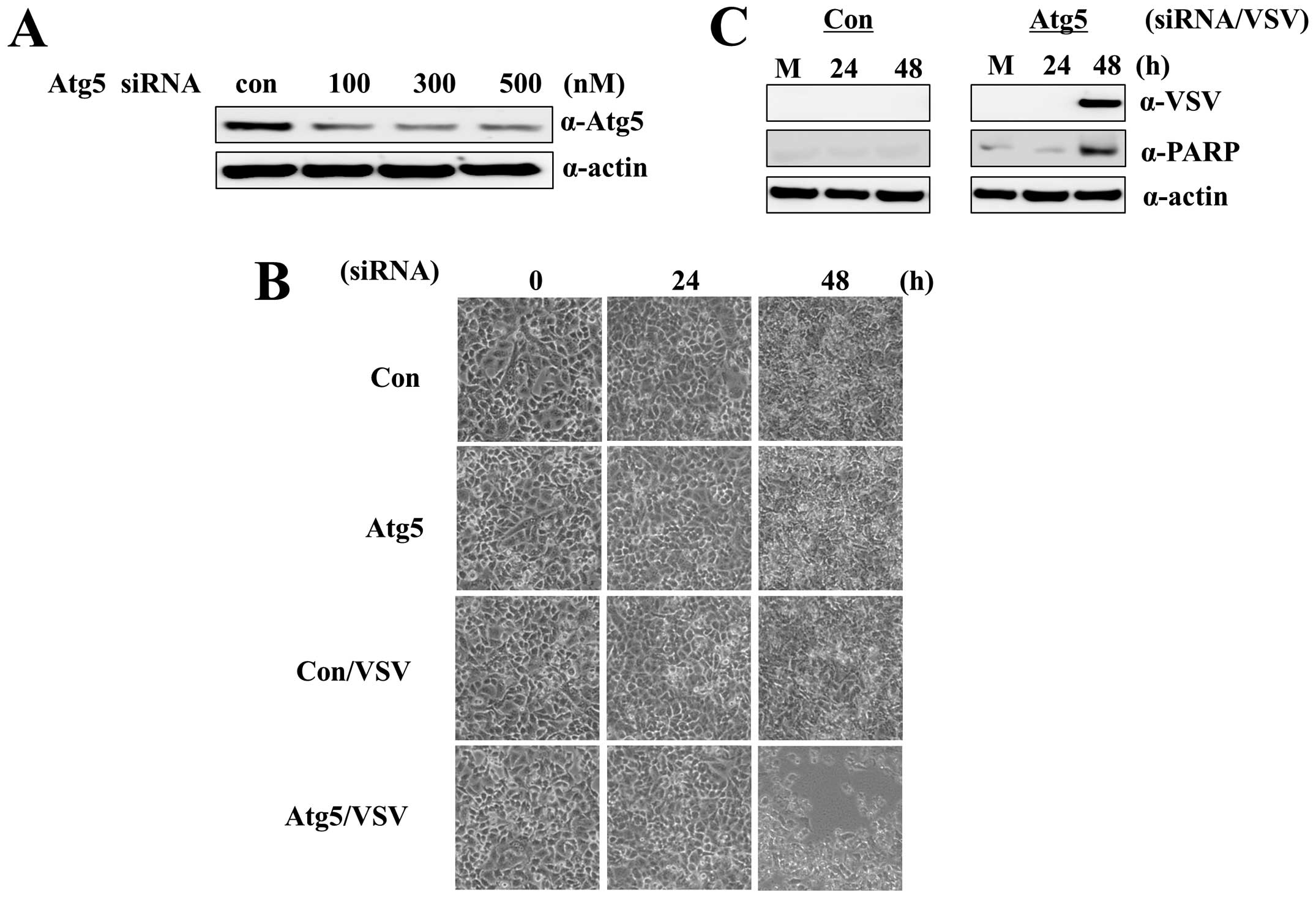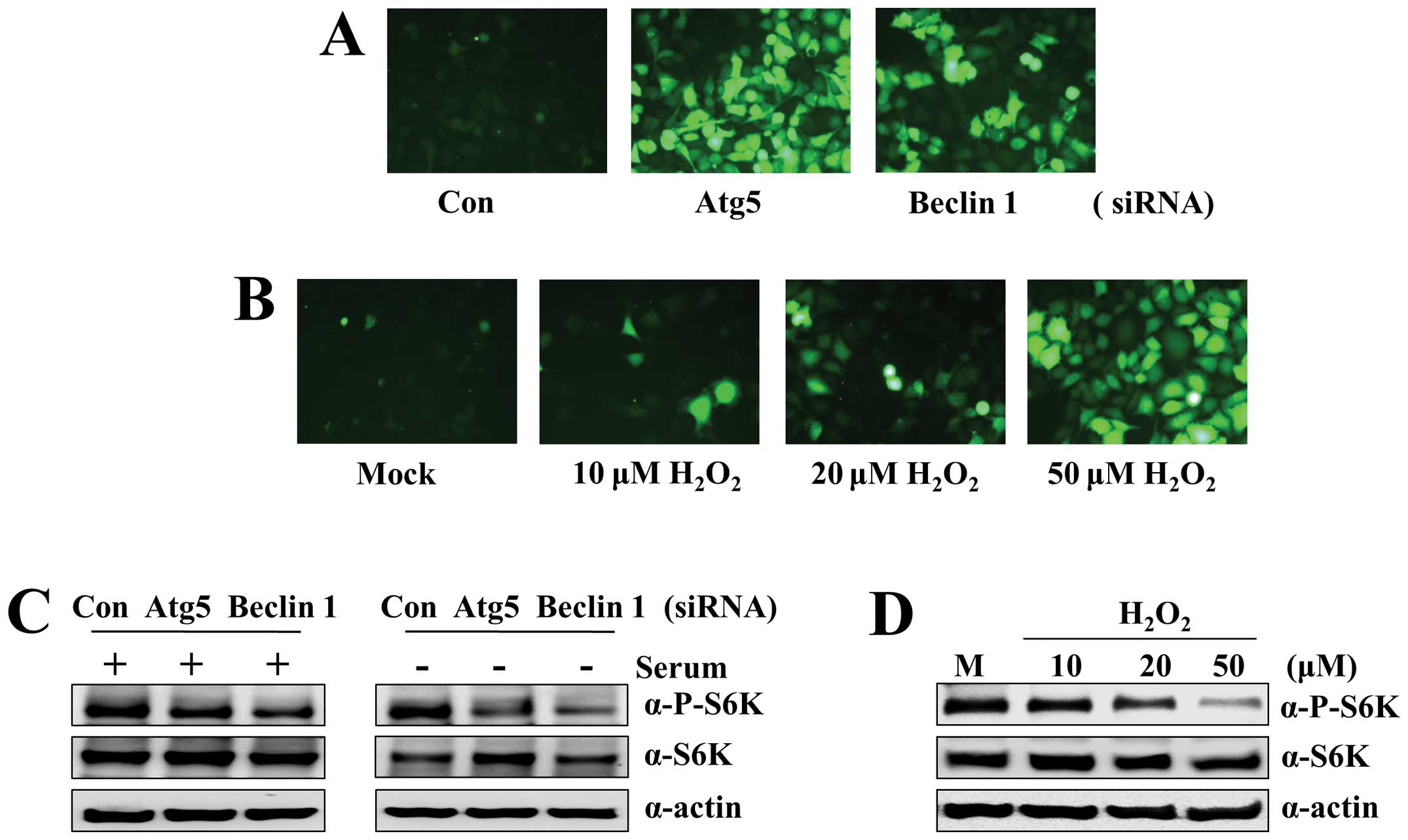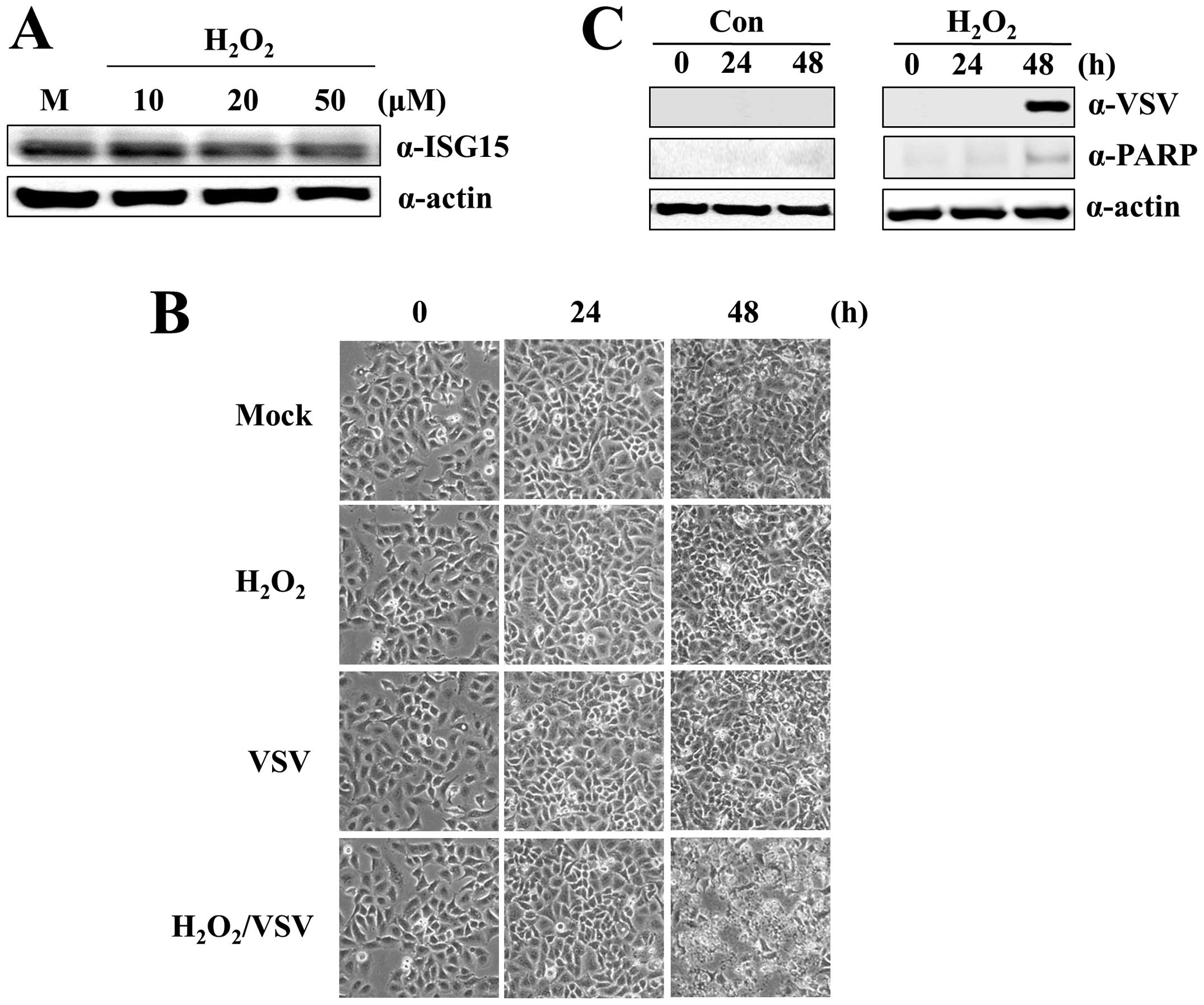|
1.
|
Lee S, Gang J, Jeon SB, et al: Molecular
cloning and functional analysis of a novel oncogene,
cancer-upregulated gene 2 (CUG2). Biochem Biophys Res Commun.
360:633–639. 2007. View Article : Google Scholar : PubMed/NCBI
|
|
2.
|
Kim H, Lee M, Lee S, et al:
Cancer-upregulated gene 2 (CUG2), a new component of centromere
complex, is required for kinetochore function. Mol Cells.
27:697–701. 2009. View Article : Google Scholar : PubMed/NCBI
|
|
3.
|
Park EH, Park EH, Cho IR, et al: CUG2, a
novel oncogene confers reoviral replication through Ras and p38
signaling pathway. Cancer Gene Ther. 17:307–314. 2010. View Article : Google Scholar : PubMed/NCBI
|
|
4.
|
Malilas W, Koh SS, Kim S, et al: Cancer
upregulated gene 2, a novel oncogene, enhances migration and drug
resistance of colon cancer cells via STAT1 activation. Int J Oncol.
43:1111–1116. 2013.PubMed/NCBI
|
|
5.
|
Malilas W, Koh SS, Srisuttee R, et al:
Cancer upregulated gene 2, a novel oncogene, confers resistance to
oncolytic vesicular stomatitis virus through STAT1-OASL2 signaling.
Cancer Gene Ther. 20:125–132. 2013. View Article : Google Scholar : PubMed/NCBI
|
|
6.
|
Klionsky DJ and Emr SD: Autophagy as a
regulated pathway of cellular degradation. Science. 290:1717–1721.
2000. View Article : Google Scholar : PubMed/NCBI
|
|
7.
|
Levine B and Klionsky DJ: Development by
self-digestion: molecular mechanisms and biological functions of
autophagy. Dev Cell. 6:463–477. 2004. View Article : Google Scholar : PubMed/NCBI
|
|
8.
|
Levine B and Kroemer G: Autophagy in the
pathogenesis of disease. Cell. 132:27–42. 2008. View Article : Google Scholar : PubMed/NCBI
|
|
9.
|
Shintani T and Klionsky DJ: Autophagy in
health and disease: a double-edged sword. Science. 306:990–995.
2004. View Article : Google Scholar : PubMed/NCBI
|
|
10.
|
Qu X, Yu J, Bhagat G, et al: Promotion of
tumorigenesis by heterozygous disruption of the Beclin 1 autophagy
gene. J Clin Invest. 112:1809–1820. 2003. View Article : Google Scholar : PubMed/NCBI
|
|
11.
|
Levine B: Cell biology: autophagy and
cancer. Nature. 446:745–747. 2007. View
Article : Google Scholar : PubMed/NCBI
|
|
12.
|
Takamura A, Komatsu M, Hara T, et al:
Autophagy-deficient mice develop multiple liver tumors. Genes Dev.
25:795–800. 2011. View Article : Google Scholar : PubMed/NCBI
|
|
13.
|
Espert L, Codogno P and Biard-Piechaczyk
M: Involvement of autophagy in viral infections: antiviral function
and subversion by viruses. J Mol Med. 85:811–823. 2007. View Article : Google Scholar : PubMed/NCBI
|
|
14.
|
Shoji-Kawata S and Levine B: Autophagy,
antiviral immunity, and viral countermeasures. Biochim Biophys
Acta. 1793:1478–1484. 2009. View Article : Google Scholar : PubMed/NCBI
|
|
15.
|
Levine B and Deretic V: Unveiling the
roles of autophagy in innate and adaptive immunity. Nat Rev
Immunol. 7:767–777. 2007. View
Article : Google Scholar : PubMed/NCBI
|
|
16.
|
Mulvey M, Poppers J, Sternberg D and Mohr
I: Regulation of eIF2alpha phosphorylation by different functions
that act during discrete phases in the herpes simplex virus type 1
life cycle. J Virol. 77:10917–10928. 2003. View Article : Google Scholar : PubMed/NCBI
|
|
17.
|
Lee HK, Lund JM, Ramanathan B, Mizushima N
and Iwasaki A: Autophagy-dependent viral recognition by
plasmacytoid dendritic cells. Science. 315:1398–1401. 2007.
View Article : Google Scholar : PubMed/NCBI
|
|
18.
|
Yoneyama M, Kikuchi M, Natsukawa T, et al:
The RNA helicase RIG-I has an essential function in double-stranded
RNA-induced innate antiviral responses. Nat Immunol. 5:730–737.
2004. View
Article : Google Scholar : PubMed/NCBI
|
|
19.
|
Kato H, Takeuchi O, Sato S, et al:
Differential roles of MDA5 and RIG-I helicases in the recognition
of RNA viruses. Nature. 441:101–105. 2006. View Article : Google Scholar : PubMed/NCBI
|
|
20.
|
Jounai N, Takeshita F, Kobiyama K, et al:
The Atg5 Atg12 conjugate associates with innate antiviral immune
responses. Proc Natl Acad Sci USA. 104:14050–14055. 2007.
View Article : Google Scholar : PubMed/NCBI
|
|
21.
|
Tal MC, Sasai M, Lee HK, Yordy B, Shadel
GS and Iwasaki A: Absence of autophagy results in reactive oxygen
species-dependent amplification of RLR signaling. Proc Natl Acad
Sci USA. 106:2770–2775. 2009. View Article : Google Scholar : PubMed/NCBI
|
|
22.
|
Kongara S and Karantza V: The interplay
between autophagy and ROS in tumorigenesis. Front Oncol. 2:1712012.
View Article : Google Scholar
|
|
23.
|
Alain T, Lun X, Martineau Y, et al:
Vesicular stomatitis virus oncolysis is potentiated by impairing
mTORC1-dependent type I IFN production. Proc Natl Acad Sci USA.
107:1576–1581. 2010. View Article : Google Scholar : PubMed/NCBI
|
|
24.
|
Schmid D, Dengjel J, Schoor O, Stevanovic
S and Munz C: Autophagy in innate and adaptive immunity against
intracellular pathogens. J Mol Med. 84:194–202. 2006. View Article : Google Scholar : PubMed/NCBI
|
|
25.
|
Dengjel J, Schoor O, Fischer R, et al:
Autophagy promotes MHC class II presentation of peptides from
intracellular source proteins. Proc Natl Acad Sci USA.
102:7922–7927. 2005.PubMed/NCBI
|
|
26.
|
Talloczy Z, Virgin HW IV and Levine B:
PKR-dependent autophagic degradation of herpes simplex virus type
1. Autophagy. 2:24–29. 2006. View Article : Google Scholar : PubMed/NCBI
|
|
27.
|
Talloczy Z, Jiang W, Virgin HW IV, et al:
Regulation of starvation- and virus-induced autophagy by the
eIF2alpha kinase signaling pathway. Proc Natl Acad Sci USA.
99:190–195. 2002. View Article : Google Scholar : PubMed/NCBI
|
|
28.
|
Sinha S, Colbert CL, Becker N, Wei Y and
Levine B: Molecular basis of the regulation of Beclin 1-dependent
autophagy by the gamma-herpesvirus 68 Bcl-2 homolog M11. Autophagy.
4:989–997. 2008. View Article : Google Scholar : PubMed/NCBI
|
|
29.
|
Pattingre S, Tassa A, Qu X, et al: Bcl-2
antiapoptotic proteins inhibit Beclin 1-dependent autophagy. Cell.
122:927–939. 2005. View Article : Google Scholar : PubMed/NCBI
|
|
30.
|
Gannage M, Dormann D, Albrecht R, et al:
Matrix protein 2 of influenza A virus blocks autophagosome fusion
with lysosomes. Cell Host Microbe. 6:367–380. 2009. View Article : Google Scholar : PubMed/NCBI
|
|
31.
|
Prentice E, Jerome WG, Yoshimori T,
Mizushima N and Denison MR: Coronavirus replication complex
formation utilizes components of cellular autophagy. J Biol Chem.
279:10136–10141. 2004. View Article : Google Scholar : PubMed/NCBI
|
|
32.
|
Dreux M and Chisari FV: Viruses and the
autophagy machinery. Cell Cycle. 9:1295–1307. 2010. View Article : Google Scholar : PubMed/NCBI
|
|
33.
|
Kang HT, Lee KB, Kim SY, Choi HR and Park
SC: Autophagy impairment induces premature senescence in primary
human fibroblasts. PLoS One. 6:e233672011. View Article : Google Scholar : PubMed/NCBI
|
|
34.
|
Cao W, Manicassamy S, Tang H, et al:
Toll-like receptor-mediated induction of type I interferon in
plasmacytoid dendritic cells requires the rapamycin-sensitive
PI(3)K-mTOR-p70S6K pathway. Nat Immunol. 9:1157–1164. 2008.
View Article : Google Scholar
|
|
35.
|
Lenschow DJ, Giannakopoulos NV, Gunn LJ,
et al: Identification of interferon-stimulated gene 15 as an
antiviral molecule during Sindbis virus infection in vivo. J Virol.
79:13974–13983. 2005. View Article : Google Scholar : PubMed/NCBI
|
|
36.
|
Malakhov MP, Kim KI, Malakhova OA, Jacobs
BS, Borden EC and Zhang DE: High-throughput immunoblotting.
Ubiquitiin-like protein ISG15 modifies key regulators of signal
transduction. J Biol Chem. 278:16608–16613. 2003. View Article : Google Scholar : PubMed/NCBI
|
|
37.
|
Zhao C, Denison C, Huibregtse JM, Gygi S
and Krug RM: Human ISG15 conjugation targets both IFN-induced and
constitutively expressed proteins functioning in diverse cellular
pathways. Proc Natl Acad Sci USA. 102:10200–10205. 2005. View Article : Google Scholar : PubMed/NCBI
|
|
38.
|
Osiak A, Utermohlen O, Niendorf S, Horak I
and Knobeloch KP: ISG15, an interferon-stimulated ubiquitin-like
protein, is not essential for STAT1 signaling and responses against
vesicular stomatitis and lymphocytic choriomeningitis virus. Mol
Cell Biol. 25:6338–6345. 2005. View Article : Google Scholar
|



















